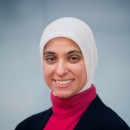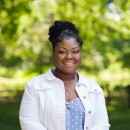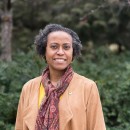School of Social Work News
Pages
 Fatima Salman Elected NASW-Michigan President
Fatima Salman Elected NASW-Michigan PresidentENGAGE Program Manager Fatima Salman, MSW ‘15, was elected president of NASW-Michigan. “I am honored and excited for my new role in this, a time when social workers are needed more than ever,” says Salman. “The effects of the pandemic have magnified the mental health crisis in our nation, the need to destigmatize mental health treatment, and the essential nature of social work practitioners in helping communities heal, deal with loss and be committed to equity and inclusion in all spheres of life. This is THE moment that all of us social workers must step up and deploy micro and macro social workers committed to anti-racist practice and ethics to address our crisis and lead Michigan in mental health recovery.” She will begin her term on July 1.
- June 11, 2021
- Learn more »
 Luke Shaefer Quoted in the New York Times on His Stimulus Check Study
Luke Shaefer Quoted in the New York Times on His Stimulus Check StudyLuke Shaefer was quoted in the New York Times on his co-authored study showing that the last two rounds of stimulus checks substantially reduced hardship, especially among the poorest households and those with children. Shafer said “We see an immediate decline among multiple lines of hardship concentrated among the most disadvantaged families.”
- June 3, 2021
- Learn more »

 Rogério M. Pinto and Daicia Price Receive Harold R. Johnson Diversity Service Award
Rogério M. Pinto and Daicia Price Receive Harold R. Johnson Diversity Service AwardProfessor and Associate Dean of Research and Innovation Rogério M. Pinto and Clinical Assistant Professor Daicia Price have received the 2021 Harold R. Johnson Diversity Service Award.
The award recognizes U-M faculty whose service goes above and beyond their regular duties and contributes to the development of a culturally and ethnically diverse campus community.
- June 2, 2021
- Read more about this year’s recipients »
 Trina Shanks Quoted in CNN on the Legacy of Racial Violence
Trina Shanks Quoted in CNN on the Legacy of Racial ViolenceProfessor Trina Shanks discusses with CNN the lasting impact of racial violence from the end of the Civil War through the early 20th century. The Tulsa race massacre, which took place 100 years ago this week, was one of the worst acts of racial violence in American history, and part of a larger pattern of assault. “If Blacks were successful and actually were visibly prosperous, that made them a target. Some of the violence might have been triggered by this economic envy,” said Shanks. She explains that some White Americans thought, “How can we make sure that we reserve these economic benefits and opportunities for the White population and our children and push Blacks out so there can be more for us.”
- June 1, 2021
- Learn more »
 Rogério M. Pinto Speaks with Fox 17 on How Protests Affect Public Opinion
Rogério M. Pinto Speaks with Fox 17 on How Protests Affect Public OpinionProfessor Rogério M. Pinto spoke with Fox 17 West Michigan about how demonstrations can change public opinion. In the wake of George Floyd’s death last year, there were over 10,000 protests and demonstration events over the summer, 95% of them were peaceful. “Protests are also effective in the sense of changing people’s hearts, not just their opinions but changing how they feel about groups in the population,” said Pinto.
- June 1, 2021
- Learn more »
 Trina Shanks on Creating Change Through Public Engagement
Trina Shanks on Creating Change Through Public EngagementProfessor Trina Shanks discusses how public engagement connects U-M, Detroit and local communities. Shanks research focuses on creating solutions, including childhood saving accounts and neighborhood investment programs. After initially researching the “why” in racial income disparity, Shanks learned “I’d really prefer to be part of the conversation about concrete changes that can make a difference in helping people to thrive and improve life chances for all people, particularly those facing economic hardship.”
- June 1, 2021
- Learn more »
 Andy Grogan-Kaylor 2021 Recipient of the Doctoral Student Organization Faculty Award
Andy Grogan-Kaylor 2021 Recipient of the Doctoral Student Organization Faculty AwardProfessor Andy Grogan-Kaylor has been chosen as this year’s recipient of the Doctoral Student Organization Faculty Award. Since 2019, doctoral students have collectively selected one professor to honor with the recognition. "Andy has taught and mentored many doctoral students. His approach to teaching methods courses is engaging for students across a range of methodological backgrounds. His courses help us see how methods can be leveraged as a tool to advance social justice. In addition to supporting students through teaching, Andy provides a great deal of support outside the classroom. Throughout my years in the program, I have consistently noticed that doctoral students go to Andy with complex methodological questions. We always come away better equipped to move forward with our research."
- May 28, 2021
- Lauren Whitmer 2021-2022 Recipient of the Alfredo D. & Luz Maria P. Gutierrez Dissertation Award
PhD student Lauren Whitmer is the 2021-22 recipient of the U-M Center for Latin American and Caribbean Studies (LACS) Alfredo D. & Luz Maria P. Gutierrez Dissertation Award. The award will support Whitmer in the writing of her dissertation, “Finding a Way Through the Violence: How Mujeres Abusadas in Lambayeque, Peru Navigate Formal and Informal Help-Seeking.” The selection committee specifically cited the high quality of Whitmer’s scholarly work. “I am very thankful for this support, which will allow me to dedicate myself, fully, to writing my dissertation in the coming academic year. Additionally, it is so gratifying to have my work recognized as an important and valuable contribution to the field of LACS,” says Whitmer.
- May 27, 2021
- MSW Student and U.S. Marine Corp Veteran Cassie Elder Shared Resources and Support
MSW student Cassie Elder is a mother and U.S. Marine Corp veteran. In a webinar this week for mothers serving in the armed forces, Elder shared her experiences to help female veterans searching for resources and support. “I hope that more folks will begin to acknowledge, recognize, and understand the complexities of being a veteran and service member while also being a mom,” she said. “I also hope to bring more visibility to women in the military and our unique experiences.”
- May 27, 2021
- Learn more »
- PhD Student and Reverend Charles Williams Discusses the COVID-19 Vaccine Race Gap with the HuffPost
PhD student and Reverend Charles Williams of Detroit’s King Solomon Baptist Church is featured in a HuffPost article about closing the COVID-19 vaccine race gap. Citing accessibility and hesitancy, Williams thinks it could be a year or more before citywide vaccination rates in Detroit catch up to the rest of the country. “There’s a sincere concern about the care that many of us get when we go to the doctor’s office, end up in the hospital,” Williams said. “You talk to any Black family, we all have the same strategy ― somebody is going to have to be there around the clock, in the room, to stay on top of these nurses and to make sure the doctor comes by, because if we don’t practice that strategy, the system will let our loved one down.”
- May 27, 2021
- Learn more »